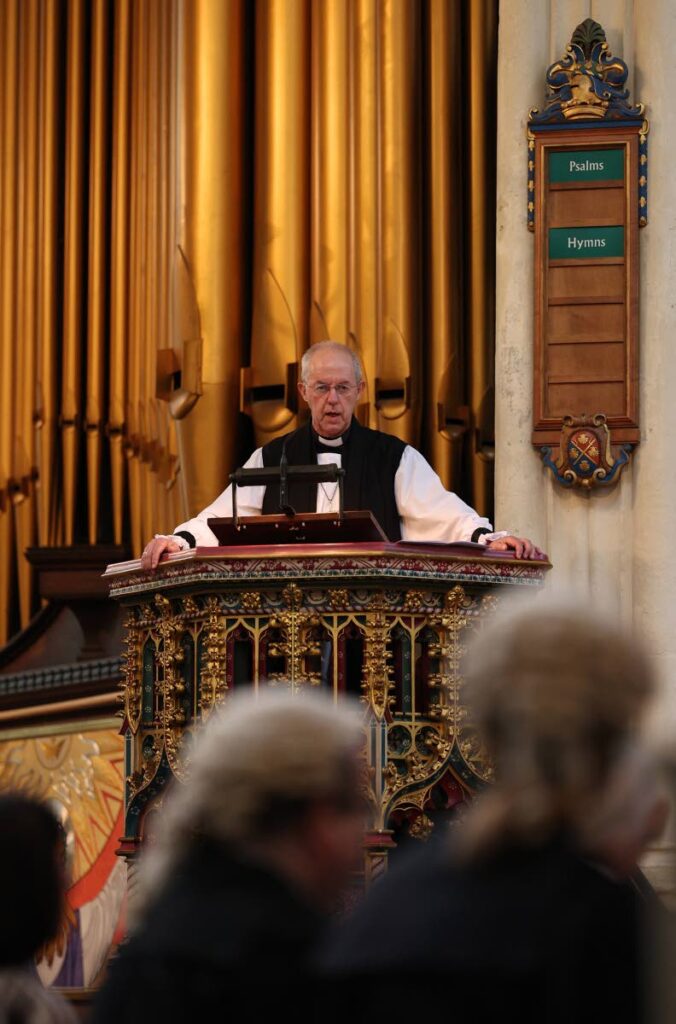Archbishop of Canterbury admits family connection to slave trade

SCOTTISH writer Alex Renton says the disclosure by the Archbishop of Canterbury about his family's connection to the slave trade underscores the need for people to speak about the evil it inflicted on generations of people and to work to right the wrongs caused by this tragic chapter in the world's history.
In a statement on October 21, Archbishop Justin Welby said, "I have recently discovered that my biological father, the late Sir Anthony Montague Browne, had an ancestral connection to the enslavement of people in Jamaica and Tobago."
He added, "His great, great grandfather was Sir James Fergusson, an owner of enslaved people at the Rozelle Plantation in St Thomas, Jamaica. While I sadly only discovered my relationship to Sir Anthony in 2016, three years after his death, I did have the delight of meeting my half-sister and her son."
Welby said a recent trip to Jamaica "has helped me to confront the legacies of enslavement in the Caribbean and the responsibility owed to those who still suffer from the effects of this evil trade."
He thanked the people who have given their time to give tireless research in this field.
Welby said many of these people are descendants of enslaved people.
"I reiterate the Church Commissioners’ commitment to a thorough and accurate research programme, in the knowledge that archives have far more to tell us about what has come before us – often in a very personal way. I give thanks to God for this journey."
Renton discovered a connection of a branch of his family, the Fergussons, to the slave trade.
He wrote about it in 2021 in his book, "Blood Legacy: Reckoning with a Family’s Story of Slavery."
Renton visited the family's estates in Tobago and Jamaica.

The Fergussons of Kilkerran owned the Carrick Estate at Bloody Bay in Tobago from 1770 to the 1790s.
At any one time, as many as 70 African people and children were enslaved there.
They also co-owned the Rozelle sugar estate in Jamaica from 1760 to 1865.
At its height, there were 198 enslaved people working there.
Information provided by Renton said, "The Fergussons shared compensation with their co-owners, the Hunter-Blair family, of £3,591 8s, 8d in 1836 for giving up their enslaved 'property' when Britain abolished slavery between 1833 and 1838."
In a statement, Renton said, "The story of British enslavement of Africans isn’t over. The legacies are still affecting lives in UK and all over the Caribbean. It was a racist enterprise, backed by British law and the British state and it is time we faced up to this past and our debts."
He added, "‘Members of the family have been making personal donations towards repair initiatives since our generation became aware of the Fergusson history in transatlantic slavery a few years ago.
"We give as we can to educational organisations and to support youth and economic empowerment efforts in Tobago, Jamaica and the UK."
A separate statement provided by Sir Adam Fergusson, the 10th baronet, on behalf of the family, said, "The Archbishop's connection with the family is a surprise to us all. It is sobering that, five or six generations on, very large numbers of us will have links, known and unknown, to this terrible phase of our history."
He added the family's involvement in slavery is a horrible part of its past.
"The links have been very fully researched and written about in recent years, as part of the long overdue wider awareness of Ayrshire's, Scotland's and Britain's role."
"The Archbishop's connection with the family is a surprise to us all. It is sobering that, five or six generations on, very large numbers of us will have links, known and unknown, to this terrible phase of our history."
Renton said this matter involves the UK indirectly in terms of its duty to acknowledge what it did in relation to slavery and the call for reparations.
He repeated his family recognised three to four years ago that their ancestors had carried out this "terrible crime against humanity in Jamaica and Tobago, that many African people had been treated like animals and died horribly."
Renton said, "This is an awful part of history that still affects people in the UK, people in Tobago today."
He added it was racism that allowed this to happen.
Renton has also established the Heirs of Slavery group with Laura Trevelyan, David Lascelles, Charles Gladstone and other people.
The group works to encourage other families enriched by slavery wealth to acknowledge their history, apologise and support campaigns for reparations in Europe and the Caribbean.
On October 20, TT National Reparations Committee chairman Dr Claudius Fergus rejected a recent position taken by the British government that reparations were not on the agenda of the Commonwealth Heads of Government Meeting (CHOGM) in Samoa for discussion.
The CHOGM began on October 21 and ends on October 26.
At Emancipation Day celebrations in Port of Spain, the Prime Minister said Caricom intends to speak "forcefully" on the issue of reparations at the CHOGM.
Dr Rowley, who left to attend the CHOGM on October 21, said Caricom was looking forward to the reaction from the new British Labour government on this issue.

Comments
"Archbishop of Canterbury admits family connection to slave trade"